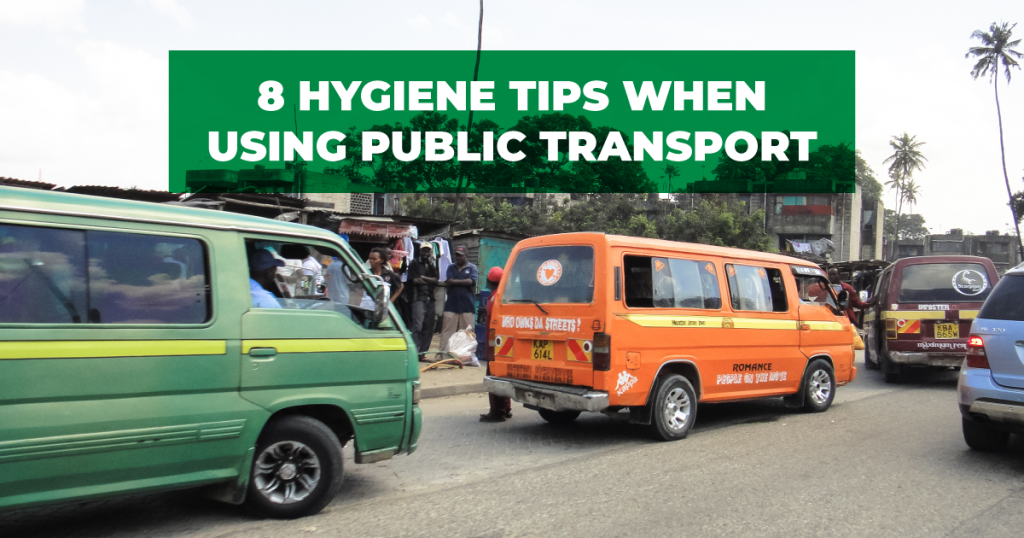The effects of the COVID-19 pandemic are being felt in different parts of the world and the transport sector here in Kenya has not been spared. The government has put in strict measures to ensure that people are staying safe wherever they are. The message being echoed from all over the world is to stay at home. But what about the people who can’t afford to do this because they have to make a living or don’t have the ability to work from home? How then can you protect yourself when using public service vehicles?
1. Avoid touching the rails in the matatu

This feels like a tall order. How will you climb onto a bus without supporting yourself on the rails? It is difficult, but imagine how many people touch those rails in a day. On top of that, most of the owners don’t wash the interiors frequently. It is important to try to avoid touching these rails to protect yourself from germs. If you must or cannot avoid it, use tissue or a serviette and dispose of it immediately.
2. Sanitize your hands when you board and when you alight from the vehicles

In the event that you were unable to avoid touching the rails in the matatu, the only way out would be to sanitize your hands as soon as you alight. Most PSVs now offer hand sanitizers to the passengers while they board the vehicles. Don’t be stubborn, sanitize your hands and protect yourself as well as the people around you. Walk with a small bottle of hand sanitizer in case the matatus do not provide.
3. Avoid using your phone when commuting

The world is now a global village. We all want to keep up with what’s currently happening while we are stuck in traffic. We, therefore, keep checking our phones for news and social media updates. However, during this trying period where we have a pandemic on our hands – no pun intended, it is advisable to keep our phones away. This is because you may have gotten in contact with the virus and you use those same hands to touch your phone and then in the process also touch your face. Reports from WHO advise against touching your face with dirty hands as it is an easy way to infect yourself.
4. Cough or sneeze into the crook of your elbow

Since the first confirmed case of the COVID-19 in Kenya, a lot of people are on edge especially when someone with a cold or flu sneezes or coughs in their vicinity. Well, as a responsible citizen, if you feel like you have symptoms of a cold or a flu stay at home. If you have to be outside, cough or sneeze into the crook of your elbow. You can also open the windows to allow proper ventilation. As soon as you get to your destination wash your hands with clean water and soap.
5. Always have pocket tissues
Sneezing and coughing into the crook of your elbow may be a new concept to some people as they are used to covering their mouths instead. However, it is better to always have pocket tissues or a handkerchief at all times. You can cough or sneeze into them and later on dispose of them properly to avoid getting the people around you sick.
6. Avoid getting into overloaded matatus

Your safety is very important. An overloaded matatu is not only a causative agent for an accident but also one of the easier ways to spread the virus. When the matatu is crowded, it becomes difficult for air to circulate. We need to respect the social distance rule even when using public transportation. It may make most public service vehicles hike their prices but you are better safe than sorry.
7. Avoid standing in crowded bus terminals

According to the latest WHO directive, 6 is a crowd. In Kenya, most bus terminals do not have queues and passengers tend to scramble for the buses instead of taking turns to board the vehicles. During this scramble and partition for spaces, one infected person coughing or sneezing can cause at least 5 or more people in close proximity to contact the virus. It is important that we act civil and respect the 1.5 metres social distance rule to keep ourselves and the people around us safe.
8. Wash your hands

It has been stressed over and over again. We must wash our hands as soon as possible especially if you have been handling money during your commute. You may have touched the rails on the matatu or the seats or something. Who really knows. Sing a happy birthday song twice as your scrub and clean all the nooks and crooks of your hands up to the elbow as soon as you get to either your workplace or your house. Limit the things you touch before you wash your hands and if it is unavoidable, take note of them and wipe them down afterwards.
Summary
In the midst of the ongoing Covid-19 pandemic, everyone is a suspect. This is because it takes up to 14 days of incubation period before the virus can be detected. The best preventive measure is to stay at home. However, sometimes you may be required to move around and so on. Be sure to follow the tips we have provided above to lessen your chance of getting infected while using matatus or cabs transportation. Stay safe.
